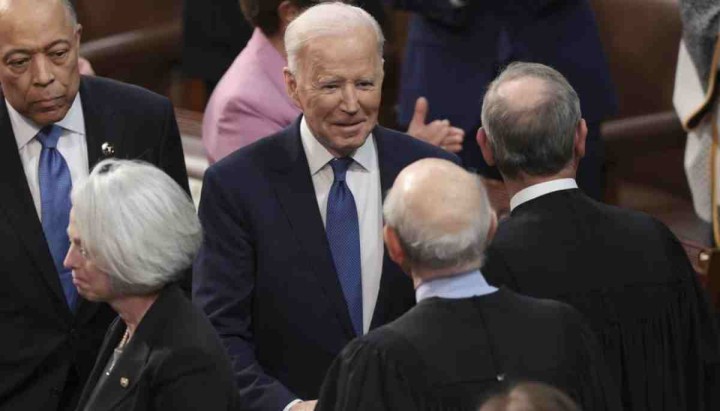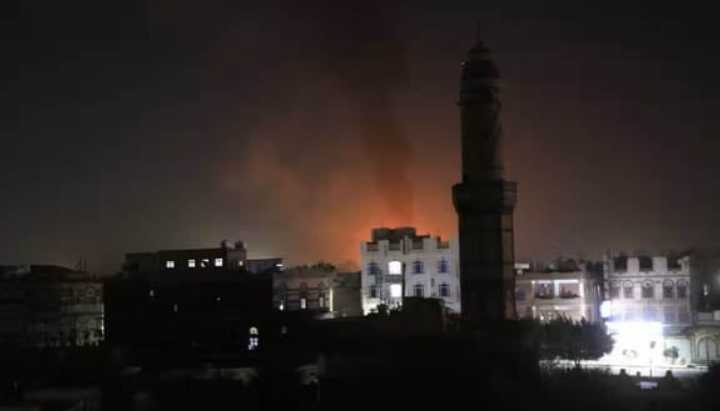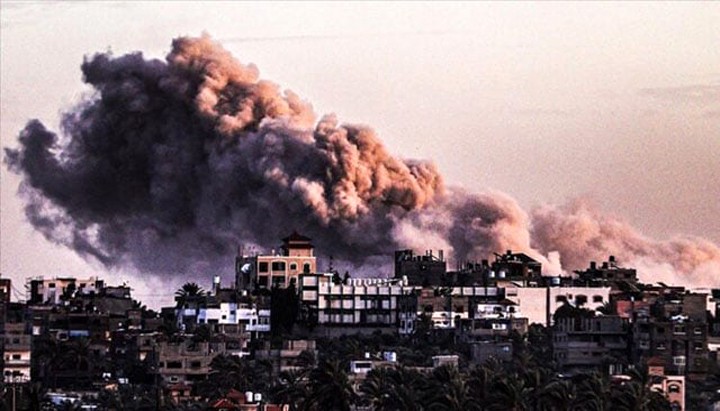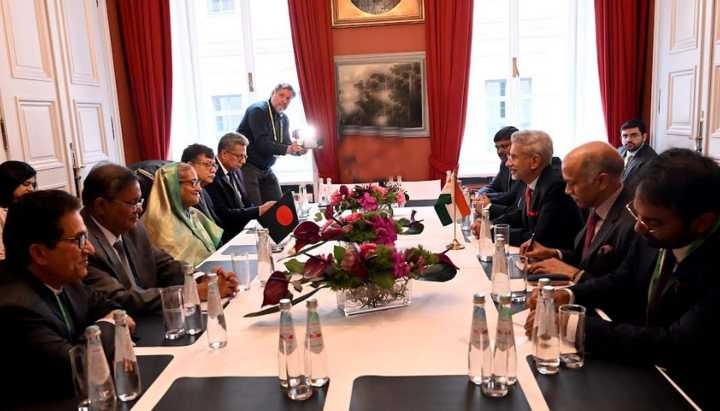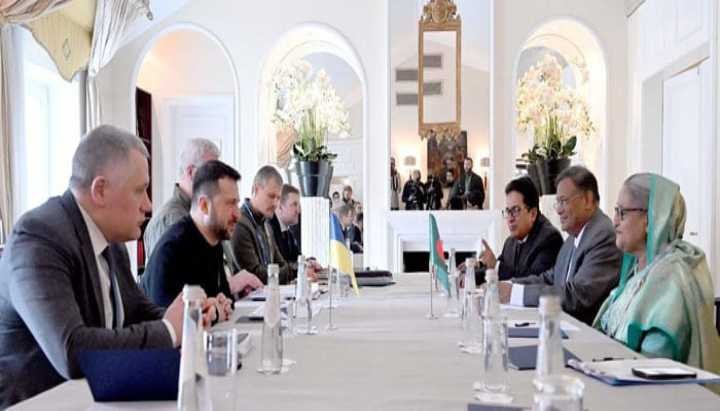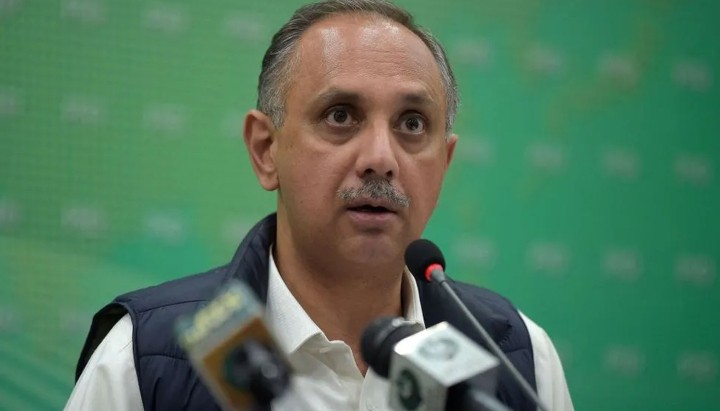Addressing a concerned nation and anxious world, President
Joe Biden vowed in his first State of the Union address Tuesday night to check
Russian aggression in Ukraine, tame soaring U.S. inflation and deal with the
fading but still dangerous coronavirus.
Biden declared that he and all members of Congress, whatever
political differences there may be, were joined “with an unwavering resolve
that freedom will always triumph over tyranny.” He asked the lawmakers crowding
the House chamber to stand and salute the Ukrainians as he began his speech.
They stood and cheered.
Biden highlighted the bravery of Ukrainian defenders and the
commitment of a newly reinvigorated Western alliance that has worked to rearm
the Ukrainian military and cripple Russia’s economy through sanctions. He
warned of costs to the American economy, as well, but warned ominously that
without consequences, Russian President Vladimir Putin’s aggression wouldn’t be
contained to Ukraine.
“Throughout our history we’ve learned this lesson – when
dictators do not pay a price for their aggression, they cause more chaos,”
Biden said. “They keep moving. And, the costs and threats to America and the
world keep rising.”
As Biden spoke, Russian forces were escalating their attacks
in Ukraine, having bombarded the central square of country’s second-biggest
city and Kyiv’s main TV tower, killing at least five people. The Babi Yar
Holocaust memorial was also damaged.
Biden announced that the U.S. is following Canada and the
European Union in banning Russian planes from its airspace in retaliation for
the invasion of Ukraine. He also said the Justice Department was launching a
task force to go after crimes of Russian oligarchs, whom he called “corrupt
leaders who have bilked billions of dollars off this violent regime.”
“We are coming for your ill-begotten gains,” he said,
pledging that the U.S. and European allies were coming after their yachts,
luxury apartments and private jets.
“Putin may circle Kyiv with tanks, but he will never gain
the hearts and souls of the Ukrainian people,” Biden said. “He will never
extinguish their love of freedom. He will never weaken the resolve of the free
world.”
Even before the Russian invasion sent energy costs
skyrocketing, prices for American families had been rising, and the COVID-19
pandemic continues to hurt families and the country’s economy.
Biden outlined plans to address inflation by reinvesting in
American manufacturing capacity, speeding supply chains and reducing the burden
of childcare and eldercare on workers.
“We have a choice,” Biden said. “One way to fight inflation
is to drive down wages and make Americans poorer. I have a better plan to fight
inflation. Lower your costs, not your wages.”
Biden entered the House chamber without a mask, in a
reflection of the declining coronavirus case counts and new federal guidance
meant to nudge the public back to pre-pandemic activities. But the Capitol was
newly fenced due to security concerns after last year’s insurrection.
Set against disquiet at home and danger abroad, the White
House had conceived Tuesday night’s speech as an opportunity to highlight the
improving coronavirus outlook, rebrand Biden’s domestic policy priorities and
show a path to lower costs for families grappling with soaring inflation. But
it has taken on new significance with last week’s Russian invasion of Ukraine
and nuclear saber-rattling by Putin.
As is customary, Energy Secretary Gina Raimondo was kept in
a secure location during the address ready to take over the government in the
event of a catastrophe, in holdover from the Cold War that took on new
significance in light of Putin’s threats.
In an interview with CNN and Reuters, Zelenskyy said he
urged Biden to deliver a strong and “useful” message about Russia’s invasion.
Ahead of the speech, the White House announced that Ukrainian Ambassador to the
U.S. Oksana Markarova would join first lady Jill Biden in the galleries to
watch Biden’s address.
Rising energy prices as a result of Russia’s war in Ukraine
risk exacerbating inflation in the U.S., which is already at the highest level
in 40 years, eating into people’s earnings and threatening the economic
recovery from the pandemic. And while the geopolitical crisis in Eastern Europe
may have helped to cool partisan tensions in Washington, it didn’t erase the
political and cultural discord that is casting doubt on Biden’s ability to
deliver on his pledge to promote national unity.
Biden spoke to an American public that is frustrated with
his performance. A February AP-NORC poll found that more people disapproved
than approved of how Biden is handling his job, 55% to 44%. That’s down from a
60% favorable rating last July.
Ahead of the speech, White House officials acknowledged the
mood of the country is “sour,” citing the lingering pandemic and inflation.
Biden, used his remarks to highlight the progress from a year ago — with the
majority of the U.S. population now vaccinated and millions more people at work
— but also acknowledged that the job is not yet done, a recognition of American
discontent.
Biden aides say they believe the national psyche is a
“trailing indicator” that will improve with time. But time is running short for
the president, who needs to salvage his first-term agenda to revive the political
fortunes of his party before November’s midterm elections.
Before Biden spoke, House Republicans said the word “crisis”
describes the state of the union under Biden and Democrats — from an energy
policy that lets Russia sell oil abroad to challenges at home over jobs and
immigration.
“We’re going to push the president to do the right thing,”
said House Minority Leader Kevin McCarthy.
At least a half dozen lawmakers, including Reps. Jamie
Raskin and Pete Aguilar, both members of the committee investigating last
year’s Capitol riot, and Sen. Alex Padilla, D-Calif., had tested positive for
COVID-19 and were not expected at the Capitol for the speech.
Where his speech to Congress last year saw the rollout of a
massive social spending package, Biden this year largely repackaged past
proposals in search of achievable measures he hopes can win bipartisan support
in a bitterly divided Congress before the elections.
The president also highlighted investments in everything
from internet broadband access to bridge construction from November’s $1.2
trillion bipartisan infrastructure law as an example of government reaching
consensus and delivering change for the nation.
He also appealed to lawmakers to compromise on rival
competitiveness bills that have passed the House and Senate, both meant to
revitalize high-tech American manufacturing and supply chains in the face of
growing geopolitical threats from China.
“Instead of relying on foreign supply chains – let’s make it
in America,” Biden said.
The speech came as progress on many of Biden’s other
legislative priorities remains stalled on Capitol Hill, after Democratic Sen.
Joe Manchin scuttled the sweeping “Build Back Better” spending bill that Biden
championed last fall.
As part of his pitch to voters, Biden looked to resurrect
components of the legislation, but with a new emphasis on how proposals like
extending the child tax credit and bringing down child care costs could bring
relief to families as prices rise. He was also outlined how his climate change
proposals would cut costs for lower- and middle-income families and create new
jobs.
As part of that push, Biden called for lowering health care
costs, pitching his plan to authorize Medicare to negotiate prescription drug
prices, as well as an extension of more generous health insurance subsidies now
temporarily available through the Affordable Care Act marketplaces where 14.5
million people get coverage.
He proposed new initiatives on mental health that dovetail
with growing bipartisan interest in Congress amid evidence that the pandemic
has damaged the national psyche, and discussed new ways to improve access to
health benefits for veterans sickened by exposure to the burning of waste
during their service, officials said.
Biden also appealed for action on voting rights, gun control
and police reform, which have failed to win significant Republican backing.
In addition, the president to pushed the Senate to confirm
federal judge Ketanji Brown Jackson to be the first Black woman on the Supreme
Court. He nominated her last week.


